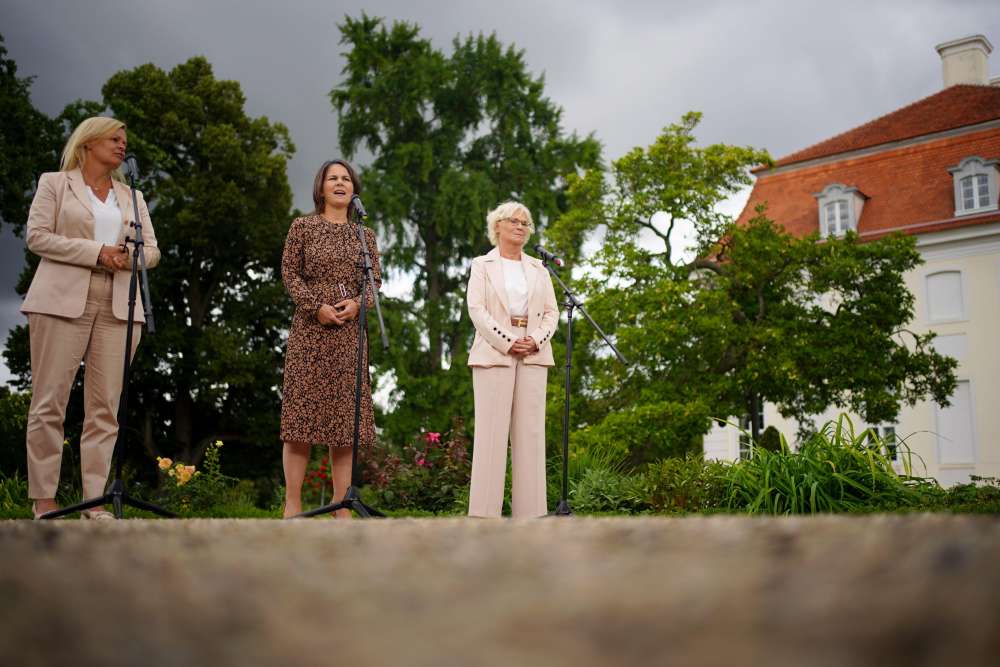No Justice, No Security: International Criminal Law Enforcement’s Rightful Place in the German National Security Strategy

(James Cridland /Wiki Commons)
International criminal law enforcement is good security policy. That is why Berlin should obligate itself to sponsor, structure and strategize its application of universal jurisdiction in its upcoming National Security Strategy.
At a recent UN General Assembly side event on accountability for Ukraine, German Foreign Minister Annalena Baerbock concluded her speech by stating: “Because when there is justice, we are all safer.” The connection she draws between justice and security is remarkably explicit. Pursuing justice is routinely regarded as a moral obligation or an exercise in historical responsibility: rarely, however, is it treated as an investment in security. In its upcoming National Security Strategy, Germany has the chance to cement this interconnection of justice and security – an opportunity that it should not miss. Because justice in the form of international criminal law enforcement is not only security policy – it is good security policy. Enforcing international criminal law means legitimating and strengthening the international legal order. It means upholding human rights, sending a signal of solidarity to populations under attack, and deterring international criminals by shattering their illusion of operating with impunity. It means taking control.
There are many pathways on the road to international criminal law enforcement. Recently, Germany has assumed a trailblazer role for one path toward justice: the application of universal jurisdiction. In the absence of any classical jurisdictional link – such as territoriality or perpetrator or victim nationality – universal jurisdiction allows a so-called ‘forum state’ to prosecute an individual accused of committing a grave crime. For example, a regional German court was able to invoke universal jurisdiction to adjudicate a case in which crimes against humanity were perpetrated as well as suffered by Syrian citizens on Syrian territory.
» Justice in the form of international criminal law enforcement is not only security policy – it is good security policy. «
At the moment, Germany is the country at the intersection of willing and able prosecution services, highly skilled civil society organizations and justice-craving diaspora communities. Even so, universal jurisdiction has rarely been employed to date. One reason for this is that universal jurisdiction trials come with high costs, complications and political risks. The other reason is that, even 20 years after the adoption of the Code of Crimes Against International Law, Germany has still not instituted optimal conditions for national-level international criminal law enforcement. Enter Germany’s new National Security Strategy.
The National Security Strategy should prominently commit to international criminal law enforcement, especially in connection to universal jurisdiction. Further, it must clearly articulate the connection between justice and security. And, to vest this commitment with credibility, the strategy should identify how exactly Germany will improve the surrounding conditions that would optimize national-level international criminal law enforcement. To put it concretely, Germany should use its National Security Strategy to obligate itself to sponsor, structure and strategize.
Sponsor
Criminal justice systems, whether national or international, are chronically underfunded. This not only impedes the work of prosecution services: it also risks curtailing defendants’ rights and complicates cooperation across institutions and states. While all three of these issues are extremely problematic, it is especially the latter that is most present. In the wake of Russia’s war against Ukraine, a plethora of institutions, courts and prosecution services located at the national, transnational and international level have sprung into action. This is great news, since all hands will be needed on deck – for decades to come. But, to ensure maximally efficient support, efforts need to be coordinated and labor divided.
In his concluding remarks for the G7 meeting at the end of November, German Justice Minister Marco Buschmann prominently acknowledged this need. Coordination is a task for which, for example, the Genocide Network – a transnational forum attached to Eurojust – would be well-placed. Its strategic advantage lies in its ability to connect criminal justice institutions across (European) countries. The Network’s self-declared goal is to ensure that no international criminal resides on EU territory without facing prosecution: a colossal mission, which one could think would be matched with an equally colossal budget. Far from it: The Genocide Network employs only four staff members and operates on a budget of 65,000€. While Buschmann explicitly praised the Genocide Network’s “great potential”, he remained silent on how this potential can be realized. One obvious step would be to increase the Network’s minuscule budget. Other worthy fund recipients include the War Crimes Unit, civil society organizations such as Mnemonic or CIJA, and victim associations like Yazda.
Key Points:
- Germany should sponsor key players in the realm of international criminal law enforcement through increased funding.
- Integrating universal jurisdiction cases into Germany’s criminal justice system has worked so far, but the time has come to build dedicated structures – such as low-threshold testimony collection processes.
- Germany needs a clearer strategy on universal jurisdiction, which means answering the question: To what end is Germany applying universal jurisdiction?
Structure
Unlike other pathways to international justice, applying universal jurisdiction does not depend on specific courts. Universal jurisdiction is exercised locally, in courts that can hear a case on petty theft one day and adjudicate crimes against humanity the next. For the past 20 years, this has meant that German war crimes prosecutors work within pre-existing structures. This was a good solution at the start, because it meant that following the adoption of the Code of Crimes Against International Law, universal jurisdiction could be applied without further delay. However, time is exposing the weaknesses of this approach.
One example is the collaboration between the German Federal Office for Migration and Refugees (BAMF) and prosecution services. Interviews at the BAMF, conducted as part of asylum applications, featured questions aimed at identifying witnesses, victims and perpetrators of international crimes that would then be handed to Germany’s War Crimes Unit. While this partial re-dedication of the asylum application procedure worked well with regards to Syria, the fact that there is no specific institution or process through which refugees can testify is now proving problematic. Ukrainian refugees do not have to apply for asylum. Therefore, one – maybe the – major source of evidence on international crimes is running dry. At present, the testimony of Ukrainians who fled to Germany is only recorded if the refugees proactively file their statements at local police stations – a solution whose effectiveness is highly dubious. Structures need to be built that fill this and other gaps: ideally in a way that will benefit more than just Ukrainian refugees.
Strategize
Enforcing international criminal law often means seizing opportunities when they present themselves. And while this flexibility is necessary and good, it should not preclude strategy. It is imperative that Berlin’s strategy on justice and security be able to answer the question: To what end is Germany enforcing international criminal law and applying universal jurisdiction? Criminological studies identify nine or more goals that (international) criminal justice can serve. Germany would immensely benefit from clarifying which of these goals it pursues and prioritizes. Why? Because the way in which Berlin currently applies universal jurisdiction (unintentionally?) sabotages the attainment of at least some of the possible purposes.
» It is imperative that Berlin’s strategy on justice and security be able to answer the question: To what end is Germany enforcing international criminal law and applying universal jurisdiction? «
For example: If the goal of its application of universal jurisdiction is deterrence, then where is the German criminal justice system’s targeted PR strategy? Deterrence presumes effective communication. If the goal is establishing a historical record, then why are universal jurisdiction trials not being taped? Even though laws were recently changed to enable record-keeping in criminal trials of historical significance, so far, this opportunity has only been used one single time in a purely domestic case. In the trial of Alaa M., a Syrian doctor accused of torture, the competent court even forbade note-taking in the courtroom. If the goal is to practice retribution on behalf of the victims, then why are the trials not being simultaneously translated into a language that affected persons in the courtroom can understand? Strategizing does not automatically mean changing all these established practices – but it does mean scrutinizing the usual way of doing things, which is the first step toward improvement.
German Foreign Minister Baerbock has signaled that she believes justice and security belong together. Right now, Germany has the opportunity to solidify this understanding by making clear that international criminal law enforcement belongs in the National Security Strategy. Because when there is no justice, we are all less safe.
Alicja Polakiewicz
PhD Candidate, Friedrich-Alexander-Universität Erlangen-Nürnberg
Keep on reading

German Feminist Foreign Policy: An Inside-Outside Perspective
Germany is keen on developing a feminist foreign policy – but so far, this initiative excludes many important perspectives. How Berlin can create a genuinely inclusive foreign policy that is less anthropocentric and more climate-friendly.

Strategic Corruption Is a Security Threat
Authoritarian states are using weaponized corruption to further their geopolitical objectives abroad. To tackle the issue, Germany needs a holistic strategy to effectively close the loopholes that kleptocrats exploit.

How to Design a National Security Strategy with Peace in Mind
Germany’s security will be decided in the international arena and secured through transformative approaches to conflict resolution. To draft a successful and worthy strategy, Berlin will need to approach it with a global peace mindset.